Case study
Tameside: Developing a shared outcomes framework for the local reducing parental conflict programme
This case example is part of EIF’s ongoing work to showcase how local areas are introducing change, adapting their strategies and changing the way they work to reduce parental conflict and improve outcomes for children.
This is Tameside’s story of using EIF’s RPC outcomes framework tool to develop a shared Tameside outcomes framework for their reducing parental conflict programme. It is told by Rachel Berrisford, team manager for parenting, RPC, STARS and young carers and Tameside’s single point of contact (SPOC) for reducing parental conflict; Becky Saunders, local development advisor at EIF; and Virginia Ghiara, senior research officer at EIF.
Find out more about our series of case examples or submit your local area's story.
Our starting point
Tameside is a metropolitan borough of Greater Manchester, bringing together nine towns in the Northwest of England, midway between the Pennines and the city of Manchester. Tameside has a total estimated population of 257,453. There is a rich cultural, religious, and ethnic mix, with around 6.8 per cent of the population from minority ethnic backgrounds other than European, including Afro-Caribbean, Bangladeshi, Chinese, East African, Asian, Indian and Pakistani. Other Tamesiders are of Irish, Italian, Polish or Ukrainian backgrounds. Local data shows that:
- of the 141 areas in Tameside, 11 fall within the most deprived 5.0 per cent nationally and a further 18 fall within the most deprived 10 per cent nationally
- 5.4 per cent of households have an adult with a long-term health problem or disability and dependent children
- 40 per cent of lone parents are not in employment
- 20 per cent of children in Tameside are living in low-income families
- 5.1 per cent of households with dependent children have no adults in employment.
Research evidence shows that factors such as financial stress are associated with a higher risk of parental conflict, and that when conflict is frequent, intense and poorly resolved, it puts children’s mental health and long-term outcomes at risk. The importance of addressing parental conflict has recently been recognised by Tameside’s Domestic Abuse Strategy, which includes a reference to parental conflict support.
We wanted to harness the potential of working together across agencies, recognising the services and settings that families access at different moments in their lives, the many opportunities for early identification and intervention, and the pathways to more specialist support where relationship distress exists. We also wanted to build consensus among all staff in contact with families – from youth justice, to housing or employment services, as well as schools, maternity services, early help, children’s services, and mental health.
We felt that by placing children and child outcomes at the centre of our approach and developing a shared outcomes framework we could work with our stakeholders to better identify what a stronger response would look like at a local level. We wanted to consider accumulations of risk factors and reflect on the times in families’ lives when risks of parental conflict are elevated. We also wanted to discuss the mechanisms underlying poor child outcomes.
Crucially, by developing a shared outcomes framework we hoped to be better able to evaluate our impact and understand whether our interventions are having the desired effect.
We received regular structured support from Becky Saunders, one of the local development advisors at EIF, to help us use the EIF RPC outcomes framework tool and develop a shared outcomes framework for Tameside. A key aspect to the work was to reflect on the links between interparental conflict and outcomes for parents and for their children, and create a tangible local framework that we could apply to good effect in Tameside.
The action we took
Despite knowing what we wanted to achieve, and the benefits in so doing for improving child outcomes, the task felt like a considerable one. Supporting staff from a broad range of services to recognise addressing parental conflict as everybody’s business, and to understand the role they could play in the intervention ecosystem meant we had to start with ensuring buy-in at a senior and strategic level. We were keen that our approach should be about enabling others, and that any framework would be co-produced, easy to grasp and meaningful, recognising the realities of people’s busy working lives.
We organised an initial meeting for senior leaders. At the meeting we presented the need for a shared outcomes framework and the research evidence base for a focus on child outcomes. We discussed the impact of exposure to parental discord on children, and the parental and interparental factors known to increase risk. The group was asked to identify staff members to take part in a workshop where we would develop our outcomes framework.
Around 15–20 people attended this first event and gave an enthusiastic response, including colleagues from Tameside Families Together, the voluntary sector, children’s social care, the education sector, health visiting, Active Tameside, Home Start, and senior managers from both Tameside Council and Public Health. There was a clear appetite for improving neighbourhood working, linking in with the family hubs agenda, the role of RPC champions across different agencies, and the importance of being able to demonstrate impact so that ‘thinking RPC’ can be embedded into a model of practice. There were also some notable gaps in terms of agencies represented, such as from the Police and other relevant health services, such as midwifery and school nursing. We subsequently planned to recruit new representatives to the outcomes framework workshop.
Prior to our shared outcomes framework workshop, we decided to use the EIF outcomes framework tool to reflect on the ways that risk factors lead to parental conflict, exposing children to conflict and resulting in poor child outcomes. We gathered population data on relevant risk factors to bring this to life in the Tameside context. We drew on a range of available data sources so that in the workshop we would be able to apply the known risk factors and child outcomes to our local population.

The outcomes framework workshop
The workshop was attended by 32 participants. We wanted to engage participants in the conversation, so we alternated slides with activities and breakout rooms. We planned the workshop agenda to follow the steps in the outcomes framework tool and to draw out the varied perspectives, experiences and expertise of the group. By stepping back from a focus on delivery and looking instead at what improved child outcomes would look like, we sought to orientate ourselves to the contributions of our different agencies and how we could measure impact together.

The objective of the first part of the workshop was to obtain a shared understanding of the impact of parental conflict on children, and to reach an agreement that supporting healthy relationships is everyone’s business. We presented some evidence of the impact of parental conflict on child outcomes and some key population statistics, and we linked Tameside’s data to the risk factors and child outcomes included in the EIF outcomes framework. We used the EIF outcomes framework tool to visualise different risk factors, such as financial and housing pressure, and poor parental mental health. This helped us to explore how agencies see a different part of the whole picture of family lives and experiences. During the workshop, we also identified when agencies have different opportunities to engage with parents, identify parental conflict and intervene in a timely way.
The aim of the second part of the workshop was to identify outcomes of interest based on Tameside’s population and local offer. To guide the discussion, we asked participants to interrogate a working draft of a framework rather than starting from scratch. We asked participants, working in small groups, to identify the desired outcomes they felt were most important to Tameside’s population and our local offer.

The final part of the workshop was aimed at identifying practical and relevant outcome measures. Based on the previous discussions, we reflected on the importance of using valid outcome measures. We asked participants to report if they were already using outcome measures and to list all the outcome measures they could think of that would help identify parental conflict and consider impact.
What we achieved
We successfully engaged different agencies in the development of a shared outcomes framework. The workshop has enabled us to identify parental and child outcomes of interest and is currently informing the development of the shared Tameside RPC outcomes framework, which we will use to review the impact of parental conflict and measure child and parental outcomes. The shared outcomes framework will help shape everything we do on preventing parental conflict in Tameside.
The development of the shared RPC outcomes framework has provided the opportunity to build momentum and make progress on the RPC agenda in Tameside. After the workshop, new agencies joined the RPC steering group, and there has been an increased take up of the one-day RPC training, which is now fully booked until the end of April. Practitioners have shown an increased interest in the work on parental conflict, and the focus on child outcomes (alongside parental outcomes) has been welcomed.
The workshop highlighted the importance of supporting parents who are in conflict and gave participants greater confidence in identifying cases of parental conflict. It also increased agencies’ confidence that local action on parental conflict can be supported by research and local evidence.
It feels now that we are no longer working in silos, and that agencies are seeing reducing parental conflict as more than ‘just a training package’. The work is part of the Family Hubs agenda, and other agencies are thinking about who they will recruit as champions. This project has been a gateway to getting our work on reducing parental conflict recognised.
What worked well and what we would recommend
- When we started this work, we wanted to focus mainly on the identification of measurement tools. However, the preliminary work to reflect on risk factors and outcomes of interest was crucial to understand what we wanted to measure. Thinking about Tameside’s population needs and parental conflict support gave us something to inform our discussions. Our recommendation for others would be to work on a shared outcomes framework to reflect not only on how to measure changes, but also on why changes are needed, and how they can be supported by the existing services and interventions.
- During this work it was helpful to have the support of others to move it forward and share ideas and best practice. Working together allowed us to feel we were not working in isolation and enabled our colleagues to have a better understanding of the importance of this work and the RPC agenda. Constructive challenge and feedback from someone not familiar with the area or the desired outcomes really makes you think differently.
- Having an initial meeting for senior leaders was key to ensure buy-in and to identify the people who were best placed to contribute to the outcomes framework workshop.
- We found it challenging to engage some key agencies often involved with families where there is a risk of parental conflict, such as police and maternity services. This has led us to develop a range of engagement strategies – for example through known contacts – to ensure attendance, and to plan follow-up conversations with those agencies unable to attend the workshop. We are also planning to offer brief awareness raising sessions to key staff within these agencies.
- We scheduled regular meetings to keep the work on track and broke down our activities into achievable steps as part of a project plan. This made the overall project less daunting.
EIF's reducing parental conflict outcomes framework is available here: https://www.eif.org.uk/resource/reducing-parental-conflict-outcomes-framework.
Contact details
- Rachel Berrisford, team manager for parenting, RPC, STARS and young carers
- For more information on evaluation support contact EIF.
